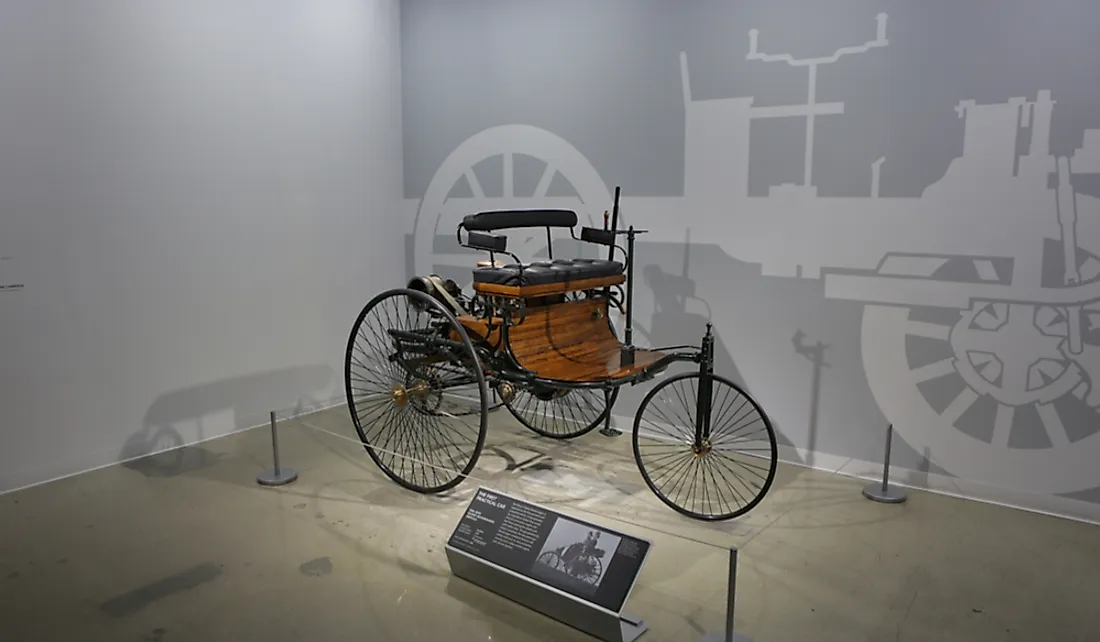What Was the First Car Ever Made?

The history of the automobile, also known more simply as the car, dates back to the seventeenth century. However, clearly identifying the first car ever built can be more challenging. For example, some historians claim that early steam-powered vehicles were the first cars, while others argue that vehicles with gasoline-powered combustion-engines are the first true cars. Similarly, various other types of vehicles, which were often powered by steam, have been identified through history. However, the invention of the first car is typically attributed to two German inventors who were working independently in the late 1800s. After receiving a patent on January 29, 1886, Karl Benz is credited for producing the first modern car.
Early Examples of Automobiles
The first example of a steam-powered car was invented by Jesuit missionary Ferdinand Verbiest in 1672. Verbiest was a Flemish astronomer who moved to China in 1658 as part of a Jesuit mission, and later built a small self-propelled car which was meant to be a toy for the Chinese Emperor. His invention featured a ball-shaped boiler that used steam to propel the vehicle’s rear wheels. The car was about 2 feet long, and although it is sometimes considered the first steam-powered automobile, the toy was too small to carry a driver.
The first steam-powered vehicle large enough to carry passengers was designed by French inventor Nicolas-Joseph Cugnot during the late eighteenth century. Cugnot built an experimental artillery tractor from 1770 to 1771, which weighed over 2.5 tons and had one thick front wheel with two large rear wheels. The car could carry up to four people but was considered to be impractical for various variables, including the fact that the boiler was positioned in front of the vehicle, which was made it difficult to drive.
French inventor and politician Francois Isaac de Rivaz built the first vehicle powered by an internal-combustion engine in 1808, and the first gasoline-powered combustion engine was installed on a pushcart by German inventor Siegfried Marcus in 1870. Siegfried made a 2-cycle combustion engine and later a 4-cycle engine that was powered by gasoline. Siegfried later refined his invention with the addition of a brake, clutch, and steering. Wilhelm Maybach and Gottlieb Daimler built the first car from scratch in 1889 in Stuttgart, Germany, while Frederick Bremer made the first petrol driven car in 1892 in Walthamstow, England, followed by Frederick Lanchester in Birmingham, England.
The First Mass Produced Car
The first practical cars featured gasoline/petrol-powered internal-combustion engines. These cars were built by numerous German inventors, with Karl Benz’s invention being considered as the first practical car in the world. Benz replaced the horse of a horse-carriage with an engine that was able to run on fuel. The vehicle had three tires and had a front wheel that was smaller and lighter than the rear wheels in order to ensure that the car performed well in hilly terrain. Benz's engine weighed about 220 pounds, was capable of generating about 0.75 horsepower, and was the most efficient engine at that time. His first car was built in Mannheim, Germany in 1885, and subsequently patented on January 29, 1886. Mass production of Benz's car began in 1888 after a successful trip with his family from Mannheim to Pforzheim in August of that year.











